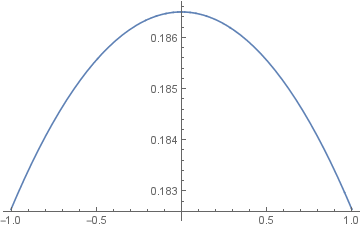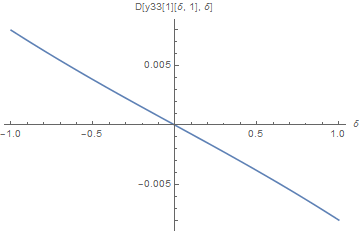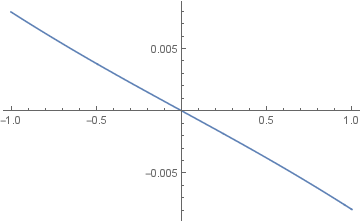Bug introduced in 10.0 or earlier and continuing through 11.3; Reported as CASE:3691952
I am trying to calculate and plot the sensitivity of a solution to some master equation using ParametricNDSolveValue[], but I'm unable to plot the derivative of the solution with respect to the parameter.
y[t_] = {y11[t], y12[t], y13[t], y21[t], y22[t], y23[t], y31[t], y32[t], y33[t]};
equations =
Table[(y'[t] - S1.y[t])[[j]] == 0, {j, 1, 9}] /. {Ω -> Γ3, Γ -> 1};
startConditions =
{y11[0] == 1/3, y12[0] == 0, y13[0] == 0,
y21[0] == 0, y22[0] == 1/3, y23[0] == 0,
y31[0] == 0, y32[0] == 0, y33[0] == 1/3};
system = Join[equations, startConditions];
solution =
ParametricNDSolveValue[system, y33[1], {t, 0, 1}, {δ, Γ3},
MaxSteps -> ∞];
Plot[Evaluate[D[solution[δ, 1], δ]], {δ, -1, 1}]
where S1 is a $9\times9$ matrix whose elements contain the parameters δ, Ω Γ3, Γ:
S1 = {{0, 0, I Ω, 0, 0, 0, -I Ω, 0, Γ},
{0, -Γ3 + 2 I δ, I Ω, 0, 0, 0, 0, -I Ω, 0},
{I Ω, I Ω, -Γ + I δ, 0, 0, 0, 0, 0, -I Ω},
{0, 0, 0, -Γ3 - 2 I δ, 0, I Ω, -I Ω, 0, 0},
{0, 0, 0, 0, 0, I Ω, 0, -I Ω, Γ},
{0, 0, 0, I Ω, I Ω, -Γ - I δ, 0, 0, -I Ω},
{-I Ω, 0, 0, -I Ω, 0, 0, -Γ - I δ, 0, I Ω},
{0, -I Ω, 0, 0, -I Ω, 0, 0, -Γ + I δ, I Ω},
{0, 0, -I Ω, 0, 0, -I Ω, I Ω, I Ω, -2 Γ}};
The code plots nothing and also doesn't print any error message. The kernel autoquits when I try to plot. (Edit: Kernel no longer terminates in v11.2.)
Whereas:
Plot[Evaluate[solution[δ, 1]], {δ, -1, 1}]

Any suggestions?



S1. $\endgroup$D[solution[δ, 1], δ] /. δ -> 1, and the kernel automatically quits. $\endgroup$Evaluate[D[solution[\[Delta], 1], \[Delta]]]runs fine for me, so it's actually extracting values from the Derivative function which causes the auto quit. $\endgroup$